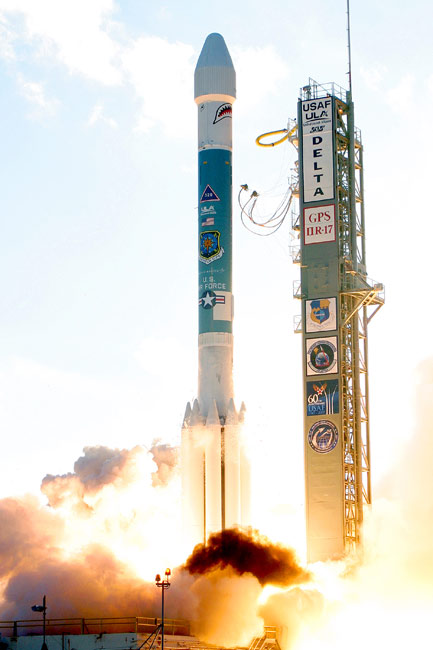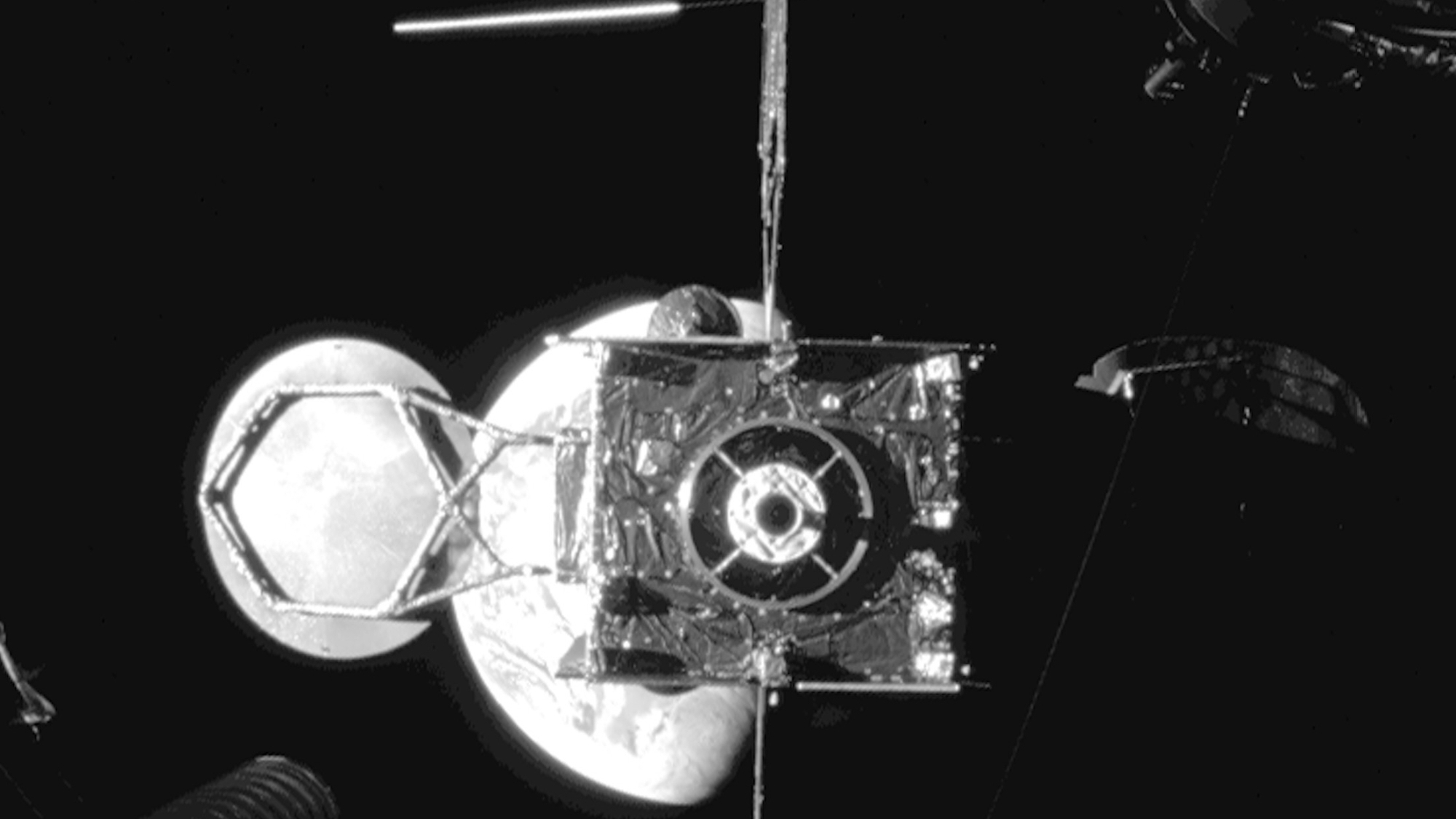New U.S. Air Force Navigation Satellite Reaches Orbit

A Global Positioning Systemsatellite with enhanced qualities is flying high after successfully soaringinto space Wednesday to reinvigorate a corner of the precision navigationnetwork.
A 12-story United LaunchAlliance Delta 2 rocket powered the 4,500-pound spacecraft to orbit from CapeCanaveral, thunderingoff its seaside pad 17A exactly on schedule at 8:23 a.m. EDT (1223 GMT).
"The 45th Space Wingand its mission partners have again accomplished another major milestone in ournational quest to improve and maintain our space capabilities," said Col.Stephen Butler, 45th Space Wing vice commander at the Cape. "The GPSconstellation has worldwide significance and all of the satellites are launchedfrom right here at the world's premier gateway to space."
Weather forecasters hadworried about thick clouds and rainshowers spoiling the launch opportunity, butskies above the launch pad remained spectacularly clear for the Delta to flyaway on more than 700,000 pounds of roaring thrust.
Aftertraveling about 11 minutes eastward over the Atlantic Ocean, the rocketachieved orbital velocity and settled into an initial orbit. It coasted in aslow, quiet rolling motion for about 50 minutes, reaching the western PacificOcean in view of the Guam tracking station when the second stage engine firedbriefly to nudge the altitude higher, then released the solid-fuel third stageto propel the satellite into the planned orbit.
A telemetry relay snagprevented engineers at the Cape from seeing the third stage action as well asdeployment of the payload in real-time. Officials waited several minutes untilsatellite ground controllers made contact with the newly-launched spacecraft toconfirm the Delta's ascent had been a complete success, marking the 77th in arow for the workhorse booster.
"My hat is off to thisGPS and Delta 2 launch team, they're a talented group of professionals whocarried out today's countdown and this entire campaign with great enthusiasm,diligence and a sharp focus on mission success," said Col. James Planeaux,the Air Force mission director and commander of the Delta Group.
Get the Space.com Newsletter
Breaking space news, the latest updates on rocket launches, skywatching events and more!
The $75 million satellite,officially known as GPS 2R-17, is the fourth in an ongoing series of eight withimprovements designed to better the GPS network. The modernized satellitestransmit additional signals and feature improvements aimed at greater accuracy,tougher resistance to interference and enhanced performance for users aroundthe world.
The new civilian signalremoves navigation errors caused by the Earth's ionosphere. The militaryadvancements will provide a more robust jam-resistant signal and enable bettertargeting of GPS-guided weapons in hostile environments.
If all goes well, a kickmotor on the GPS 2R-17 satellite will fire late Friday to circularize its orbitat 11,000 miles for the trip to join the GPS constellation.
Thecraft is headed for the Plane F, Slot 2 position of the constellation toreplace the aging GPS 2A-14 satellite, which was launched in July 1992 with aseven-year design life. The old satellite will be drifted eastward of itscurrent position and put into a backup role, Air Force officials said.
The orbiting networkcurrently has 30 operational satellites, which emit continuous navigationsignals that allow users to find their position in latitude, longitude and altitudeand determine time.
"The improved signalsprovided by the GPS satellites will continue to provide around the Earthprecise positioning, navigation and timing service any time, any place, righttime and right place supporting both the warfighter and the growing needs ofour global economy," said Col. David Madden, commander of the GlobalPositioning Systems Wing.
To keep navigationinformation flowing from GPS and the orbiting system in good health, the AirForce launches replacement satellites as they are needed. The constellation isdivided into six orbital groupings, called planes, with at least foursatellites in each.
Wednesday's liftoff was thefirst new GPS satellite launched in almost a year, but it was the 17th datingback to 1997 for the Lockheed Martin-built Block 2R spacecraft program createdto replenish the space infrastructure and replace original satellites as theyage.
"GPS is not only amilitary asset, but a national asset due to its civil applications," saidCapt. Bill Bakker, GPS 2R field program manager with the 45th Launch SupportSquadron at Cape Canaveral. "This mission is vital to the sustainment ofour GPS constellation. Our team takes a great deal of satisfaction and pride inreplenishing a constellation that is so critical to our warfighters."
Four more satellites ofthis current Block 2R generation, each having been upgraded with the newmodernized features, are left to launch. Those flights aboard Delta 2 rocketsare targeted to occur over the next 11 months -- in December, March, June andSeptember.
"We're looking forwardto an exciting year ahead where we'll process and launch four more GPS Delta 2missions," Col. Planeaux said.
A new era of satelliteswith even more advancements, called the GPS 2F series and built by Boeing, isscheduled to debut in January 2009, Air Force officials said. Those craft willfly aboard Atlas 5 and Delta 4 rockets.
- Looking Back on 50 Years of Spaceflight
- IMAGES: 20 Great Rocket Launches
- All About Satellites
Copyright 2007 SpaceflightNow.com,all rights reserved.

Join our Space Forums to keep talking space on the latest missions, night sky and more! And if you have a news tip, correction or comment, let us know at: community@space.com.
Justin Ray is the former editor of the space launch and news site Spaceflight Now, where he covered a wide range of missions by NASA, the U.S. military and space agencies around the world. Justin was space reporter for Florida Today and served as a public affairs intern with Space Launch Delta 45 at what is now the Cape Canaveral Space Force Station before joining the Spaceflight Now team. In 2017, Justin joined the United Launch Alliance team, a commercial launch service provider.









